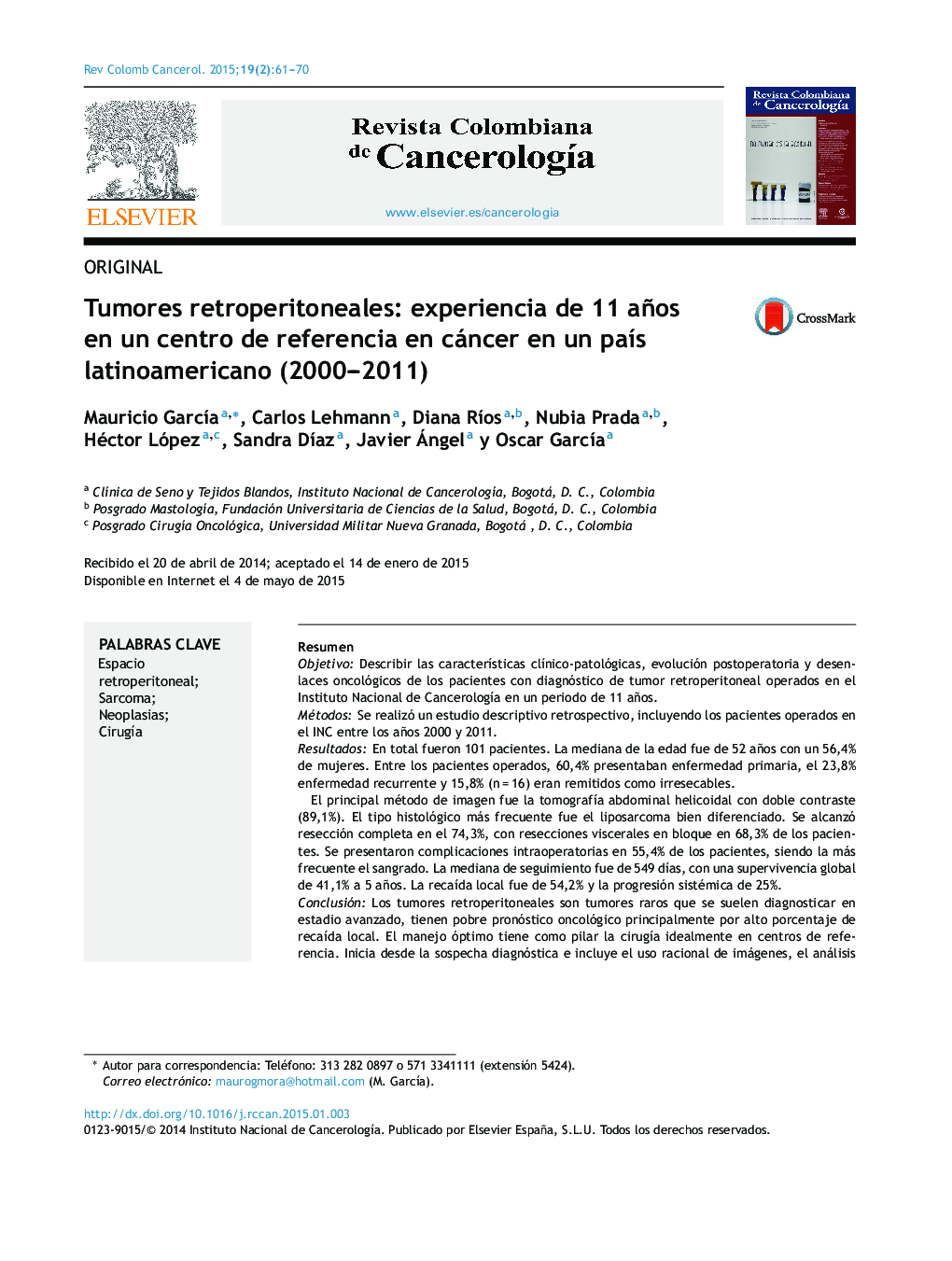| Article ID | Journal | Published Year | Pages | File Type |
|---|---|---|---|---|
| 3997117 | Revista Colombiana de Cancerología | 2015 | 10 Pages |
ResumenObjetivoDescribir las características clínico-patológicas, evolución postoperatoria y desenlaces oncológicos de los pacientes con diagnóstico de tumor retroperitoneal operados en el Instituto Nacional de Cancerología en un periodo de 11 años.MétodosSe realizó un estudio descriptivo retrospectivo, incluyendo los pacientes operados en el INC entre los años 2000 y 2011.ResultadosEn total fueron 101 pacientes. La mediana de la edad fue de 52 años con un 56,4% de mujeres. Entre los pacientes operados, 60,4% presentaban enfermedad primaria, el 23,8% enfermedad recurrente y 15,8% (n = 16) eran remitidos como irresecables.El principal método de imagen fue la tomografía abdominal helicoidal con doble contraste (89,1%). El tipo histológico más frecuente fue el liposarcoma bien diferenciado. Se alcanzó resección completa en el 74,3%, con resecciones viscerales en bloque en 68,3% de los pacientes. Se presentaron complicaciones intraoperatorias en 55,4% de los pacientes, siendo la más frecuente el sangrado. La mediana de seguimiento fue de 549 días, con una supervivencia global de 41,1% a 5 años. La recaída local fue de 54,2% y la progresión sistémica de 25%.ConclusiónLos tumores retroperitoneales son tumores raros que se suelen diagnosticar en estadio avanzado, tienen pobre pronóstico oncológico principalmente por alto porcentaje de recaída local. El manejo óptimo tiene como pilar la cirugía idealmente en centros de referencia. Inicia desde la sospecha diagnóstica e incluye el uso racional de imágenes, el análisis histológico por patólogos con experiencia, la planeación preoperatoria y la decisión de terapias neoadyuvantes o adyuvantes de acuerdo al tipo y estadio tumoral.
ObjectiveTo describe the clinical-pathological features, postoperative and oncological outcomes of patients diagnosed with retroperitoneal soft tissue tumors operated at the National Cancer Institute (NCI), over a period of 11 years.MethodsA retrospective and descriptive study was performed that included patients operated in the NCI between years 2000 and 2011.ResultsIn total there were 101 patients. The median age was 52 years, with 56.4% of them women. Among the operated patients, 60.4% had primary disease, 23.8% recurrent disease, and 15.8% (n = 16) were submitted as unresectable.The main method of imaging was abdominal helical double-contrast tomography (89.1%). The most common histological type was well differentiated liposarcoma. Complete resection was achieved in 74.3%, with en bloc resections of involved structures in 68.3% of patients. Intraoperative complications occurred in 55.4% of patients, the most frequent being bleeding. Median follow-up was 549 days, with an overall survival of 41.1% at 5 years. Local recurrence was 54.2% and the systemic progression was 25%.ConclusionRetroperitoneal tumors are rare tumors that are usually diagnosed in advanced stages. They have a poor prognosis, mainly due to a high rate of local relapse. The mainstay of optimal management is surgery, and starts from the suspected diagnosis, encompassing the rational use of images, histological analysis by experienced pathologists, preoperative planning, and the decision of neoadjuvant or adjuvant therapies according to the type and tumor stage.
